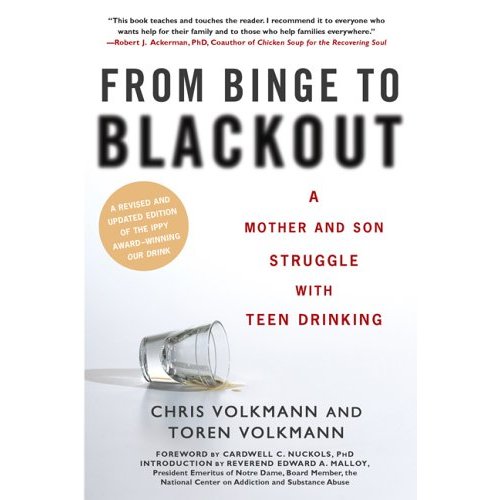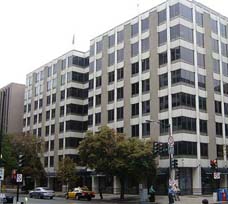2006.08.03: August 3, 2006: Headlines: COS - Paraguay: Writing - Paraguay: Alcoholism: Voice of San Diego: Paraguay RPCV Toren Volkmann writes: A Binge and a Mistake
Peace Corps Online:
Directory:
Paraguay:
Peace Corps Paraguay:
The Peace Corps in Paraguay:
2006.08.03: August 3, 2006: Headlines: COS - Paraguay: Writing - Paraguay: Alcoholism: Voice of San Diego: Paraguay RPCV Toren Volkmann writes: A Binge and a Mistake
Paraguay RPCV Toren Volkmann writes: A Binge and a Mistake

"I quickly realized how living in a constant state of intoxication had kept me closed off to my surroundings. Since I never noticed or cared about what San Diego had to offer, I missed out on most of the things that make this city such an amazing place to live. Now sober, I am seeing sides of San Diego I never knew before."
Paraguay RPCV Toren Volkmann writes: A Binge and a Mistake
A Binge and a Mistake
By Toren Volkmann
Thursday, Aug. 3, 2006 | I didn't move to San Diego looking for culture. I didn't come here really for any other reason than because it was on the beach and as far south as I could get from the land of eternal grey and rainy days where I grew up: Washington State. In the fall of 1998 I came to San Diego with great expectations. With several years of alcohol abuse already under my belt, I arrived at the University of San Diego excited to meet new people and start a new chapter in my life.
What actually began was a seemingly endless balancing act of binge drinking and scholastic achievement. Although I managed to keep my grades up, I behaved more like a crazed teenager on a spring break documentary than a serious student. Nothing was more important than drinking to me, and I allowed my college years to pass by believing that San Diego had nothing to offer beyond keg parties, bars in Pacific Beach and boozy trips to Tijuana.
I loved that Tijuana was only a short trolley ride away, and more than that I loved what I could get away with in Mexico. My first time there, having spent the better part of the night in an all-you-can-drink bar, some friends and I bounced through night clubs and strip joints, drinking as much as we could before trying to re-claim our citizenship. How I crossed the border is beyond me as I have absolutely no recollection of the incident. I've been told it was quite a scene. And so the story went for every subsequent trip to TJ, to bars in Pacific Beach, to parties on Mission Bay. The blackouts became a norm on every weekend, no matter where I went. I could have been anywhere.
At 22, I left San Diego as a full-blown alcoholic with a college diploma. That I acquired these "assets" in San Diego was irrelevant; I absorbed nothing from the community here. When I left California, my friends and family questioned me about my experience, asking, "What did you do there?" "What was it like?" "How was San Diego?" My response was almost always, "San Diego is just a college town, a party town. It has no culture." In hindsight, of course, I recognize that had I been able to peel away the beer goggles long enough I would have seen that it was I who lacked culture, not the city.
A brief stint in the Peace Corps, a halfway house in Florida, a hurricane evacuation and three years of sobriety later, I returned to San Diego last fall as a recovering alcoholic. I quickly realized how living in a constant state of intoxication had kept me closed off to my surroundings. Since I never noticed or cared about what San Diego had to offer, I missed out on most of the things that make this city such an amazing place to live. Now sober, I am seeing sides of San Diego I never knew before.
I view my return to San Diego as a privilege, an opportunity to experience this town from a whole new perspective. Now if I cross the border, it's about my interest in travel and Latin American culture, not about drinking until I lose consciousness. I live in Golden Hill, relax in Balboa Park, play music at a coffee shop in University Heights, and even "lunch" in Little Italy. These neighborhoods and what they have to offer weren't even a blip on my radar when I was drinking. Of course, San Diego is more than a collection of neighborhoods; it is a vibrant, diverse community with a depth that most cities lack. That I took for granted the rolling hills, canyons, beaches, and palm tree-lined residential blocks -- the stuff postcards are made of --leaves me feeling sheepish at best. But, much like my sobriety, it's better late than never.
Related Links
Binge to Blackout
San Diego may always see an influx of students carrying with them attitudes, expectations and habits similar to those I brought here in the fall of '98. Bars in Mission and Pacific Beach still swell with college students and drinkers in their twenties, and on many different occasions I have made it out to some of the same bars where I effortlessly drank away my college years. I find it a huge relief not to have to live that way myself, watching so many young people drinking the way I used to. It is wonderful to be able to go out and socialize normally in this town, to have fun with friends, to be a part of the nightlife when I choose to without abusing alcohol. My choices allow me to appreciate my life and this town differently.
San Diego will always be an attractive destination for young people. But there are plenty of options for those ready for something different here. The bars will always be open, but drinking is not the only thing on the menu. New restaurants, coffee shops, galleries, boutiques, and music venues in town will provide college grads and the twenty-somethings (like myself) with something better to latch on to than drink specials or hangover remedies -- when they are ready for it, that is.
Toren Volkmann is coauthor of "From Binge to Blackout: A Mother and Son Struggle with Teen Drinking," published Aug. 1 by Penguin's New American Library. To learn more about Toren's book, or to contact Toren directly, visit his website www.bingetoblackout.com. Or, send a letter to the editor here.
When this story was posted in August 2006, this was on the front page of PCOL:





Peace Corps Online The Independent News Forum serving Returned Peace Corps Volunteers
 | Peace Corps' Screening and Medical Clearance
The purpose of Peace Corps' screening and medical clearance process is to ensure safe accommodation for applicants and minimize undue risk exposure for volunteers to allow PCVS to complete their service without compromising their entry health status. To further these goals, PCOL has obtained a copy of the Peace Corps Screening Guidelines Manual through the Freedom of Information Act (FOIA) and has posted it in the "Peace Corps Library." Applicants and Medical Professionals (especially those who have already served as volunteers) are urged to review the guidelines and leave their comments and suggestions. Then read the story of one RPCV's journey through medical screening and his suggestions for changes to the process. |
 | Gates charity races to spend billions
Warren E. Buffett’s gift of $31 billion to the Bill and Melinda Gates Foundation means that for tax reasons, starting in 2009, the foundation must distribute $3 billion annually, or a little more than twice what it distributed last year.
PCOL Comment: The Foundation says that "preventing the spread of HIV is the most durable long-term solution to the AIDS epidemic, and a top priority for the foundation." Peace Corps Volunteers and Returned Volunteers have been doing just that in AIDS Education for the past 15 years. Why not consider a $100M annual contribution to the Peace Corps to put 2,500 additional volunteers in the field to expand AIDS education worldwide? |
 | The Peace Corps is "fashionable" again
The LA Times says that "the Peace Corps is booming again and "It's hard to know exactly what's behind the resurgence." PCOL Comment: Since the founding of the Peace Corps 45 years ago, Americans have answered Kennedy's call: "Ask not what your country can do for you--ask what you can do for your country. My fellow citizens of the world: ask not what America will do for you, but what together we can do for the freedom of man." Over 182,000 have served. Another 200,000 have applied and been unable to serve because of lack of Congressional funding. The Peace Corps has never gone out of fashion. It's Congress that hasn't been keeping pace. |
 | Changing the Face of Hunger
In his new book, Former Congressman Tony Hall (RPCV Thailand) says humanitarian aid is the most potent weapon the United States can deploy against terrorism. An evangelical Christian, he is a big believer in faith-based organizations in the fight against hunger. Members of Congress have recently recommended that Hall be appointed special envoy to Sudan to focus on ending the genocide in Darfur. |
 | PC will not return to East Timor in 2006
Volunteers serving in East Timor have safely left the country as a result of the recent civil unrest and government instability. Latest: The Peace Corps has informed us that at this time, the Peace Corps has no plans to re-enter the country in 2006. The Peace Corps recently sent a letter offering eligible volunteers the opportunity to reinstate their service in another country. |
 | Chris Dodd considers run for the White House
Senator Chris Dodd plans to spend the next six to eight months raising money and reaching out to Democrats around the country to gauge his viability as a candidate. Just how far Dodd can go depends largely on his ability to reach Democrats looking for an alternative to Hillary Clinton. PCOL Comment: Dodd served as a Volunteer in the Dominican Republic and has been one of the strongest supporters of the Peace Corps in Congress. |
 | Vasquez testifies before Senate Committee
Director Vasquez testifies before the Senate Foreign Relations Committee on his nomination as the new Representative to the United Nations Agencies for Food and Agriculture replacing Tony Hall. He has been the third longest serving Peace Corps Director after Loret Ruppe Miller and Sargent Shriver. PCOL Comment: Read our thanks to Director Vasquez for his service to the Peace Corps. |
 | Peace Corps stonewalls on FOIA request
The Ashland Daily Tidings reports that Peace Corps has blocked their request for information on the Volkart case. "After the Tidings requested information pertaining to why Volkart was denied the position — on March 2 — the newspaper received a letter from the Peace Corps FOIA officer stating the requested information was protected under an exemption of the act." The Dayton Daily News had similar problems with FOIA requests for their award winning series on Volunteer Safety and Security. |
 | PCOL readership increases 100%
Monthly readership on "Peace Corps Online" has increased in the past twelve months to 350,000 visitors - over eleven thousand every day - a 100% increase since this time last year. Thanks again, RPCVs and Friends of the Peace Corps, for making PCOL your source of information for the Peace Corps community. And thanks for supporting the Peace Corps Library and History of the Peace Corps. Stay tuned, the best is yet to come. |
 | History of the Peace Corps
PCOL is proud to announce that Phase One of the "History of the Peace Corps" is now available online. This installment includes over 5,000 pages of primary source documents from the archives of the Peace Corps including every issue of "Peace Corps News," "Peace Corps Times," "Peace Corps Volunteer," "Action Update," and every annual report of the Peace Corps to Congress since 1961. "Ask Not" is an ongoing project. Read how you can help. |
 | RPCV admits to abuse while in Peace Corps
Timothy Ronald Obert has pleaded guilty to sexually abusing a minor in Costa Rica while serving there as a Peace Corps volunteer. "The Peace Corps has a zero tolerance policy for misconduct that violates the law or standards of conduct established by the Peace Corps," said Peace Corps Director Gaddi H. Vasquez. Could inadequate screening have been partly to blame? Mr. Obert's resume, which he had submitted to the Peace Corps in support of his application to become a Peace Corps Volunteer, showed that he had repeatedly sought and obtained positions working with underprivileged children. Read what RPCVs have to say about this case. |
 | Why blurring the lines puts PCVs in danger
When the National Call to Service legislation was amended to include Peace Corps in December of 2002, this country had not yet invaded Iraq and was not in prolonged military engagement in the Middle East, as it is now. Read the story of how one volunteer spent three years in captivity from 1976 to 1980 as the hostage of a insurrection group in Colombia in Joanne Marie Roll's op-ed on why this legislation may put soldier/PCVs in the same kind of danger. Latest: Read the ongoing dialog on the subject. |
Read the stories and leave your comments.

Some postings on Peace Corps Online are provided to the individual members of this group without permission of the copyright owner for the non-profit purposes of criticism, comment, education, scholarship, and research under the "Fair Use" provisions of U.S. Government copyright laws and they may not be distributed further without permission of the copyright owner. Peace Corps Online does not vouch for the accuracy of the content of the postings, which is the sole responsibility of the copyright holder.
Story Source: Voice of San Diego
This story has been posted in the following forums: : Headlines; COS - Paraguay; Writing - Paraguay; Alcoholism
PCOL33948
35

























